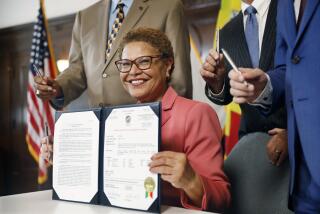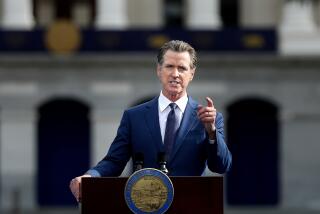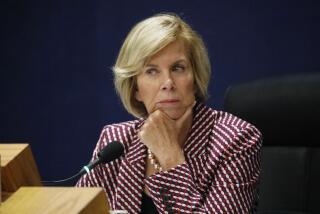West Hollywood mayor, who tested positive, describes life with the coronavirus
For West Hollywood Mayor John D’Amico, who tested positive for the novel coronavirus last week, gratefulness under quarantine looks like this: A loving husband. Two loyal dogs, Dodger and Mr. Big. And a long driveway for solo walks.
“I can imagine being stir crazy,” D’Amico said. “For now, it’s OK. It’s OK to slow down and be grateful for the things I do have.”
The mayor’s positive test on March 18 came as city officials were in the midst of aggressive planning to combat the disease’s spread. That day, city staffers were ordered to leave work. Facilities were deep-cleaned. City Hall remains closed.
A dense, 1.9-square-mile city of 37,000 people, West Hollywood had 31 confirmed cases of the new coronavirus as of Tuesday afternoon, the most per capita in Los Angeles County.
Within its large LGBTQ population, some West Hollywood residents heard echoes of the AIDS crisis, when news reports in the 1980s spoke of a mysterious “gay cancer.”
D’Amico, who is HIV positive and moved to West Hollywood in the early 1980s, told The Times that the new coronavirus “is a different challenge, and we’re rising to it.”
D’Amico said that maybe because West Hollywood has lived through a health crisis before, there’s a certain hopeful assumption that is shining through: that people who test positive will live with the new coronavirus, just as they are now with HIV and AIDS.
As to how he got the coronavarius? D’Amico said he has a possible idea.
The mayor said his husband, Keith Rand, a therapist, had attended a conference of the American Group Psychotherapy Assn. in New York in early March. The event has been tied to at least 22 positive cases, the association said in a statement.
Rand got home March 8 and, a few days later, started hearing that people at the conference were reporting being sick, D’Amico said.
“We’re fairly certain that’s how it entered our lives,” he said.
D’Amico said that on the afternoon of March 14, a Saturday, as he was working with city staffers on emergency ordinances, he started getting a headache. He figured it was from stress. The next morning, the headache was worse.
“I slept bad, I had a tweaked neck and headache,” D’Amico said. “On Sunday afternoon, I thought, wait a minute, I’m 56 years old and I’ve never had a stress headache.”
By March 16, he had a slight cough and did not go to work. He skipped the City Council meeting. That afternoon, he had a fever.
On March 17, he had a fever all day, he said. D’Amico wrote to his doctor, who practices in Mid-Wilshire, and was told to come by the doctor’s office, park in the parking lot and leave his headlights on. He got a coronavirus test in the parking lot.
That night, D’Amico took cold and flu medication, and his fever broke. He awoke on March 18 with no fever, with quickly-lessening aches and pains. That same day, he got the test result: positive.
D’Amico — who repeatedly cautioned while describing his symptoms that all cases are different and that he was not giving medical advice — said he had been seeing the same doctor since 1994 and was hopeful, even with the diagnosis.
“I didn’t feel scared, and I don’t,” D’Amico said. “I feel seen and taken care of. I got sick, and I got better, and hopefully I stay better.”
D’Amico said he and his husband were under quarantine together. His husband, after initially being unable to obtain a test, was tested late last week, D’Amico said.
“I obsessively wash my hands,” D’Amico said. “I wash my face twice a day. It really did catch me by surprise.”
D’Amico said that, right now, he hopes West Hollywood residents know that the city, even though government buildings are shut down and staffers are working remotely, is still a resource.
Lisa Belsanti, a West Hollywood spokeswoman, said city officials have schedules “stacked with conference calls and check-ins.” The next City Council meeting, on April 6, will be done remotely, she said.
“We are still working,” she said. “People are still going to get a call back.”
Belsanti said the city is trying to figure out who is the most vulnerable and to quickly meet their needs.
“It’s a lot,” she said. “As a person, as a parent, as a community member. It’s a lot as a public employee. Especially in West Hollywood, the entire reason we became a city [in 1984] was to take care of each other.
“We were largely ignored by the world at the beginning of cityhood because of the outbreak of HIV and AIDS. So our gut reaction to this is, how are our community members doing? Do they have enough resources? ... Our hearts are broken because we can’t perform the kinds of services we’re used to performing.”
More to Read
Updates
2:26 p.m. March 24, 2020: This article was updated to increase the number of confirmed cases of COVID-19 in West Hollywood from 19 as of Monday morning to 31 as of Tuesday afternoon.
Start your day right
Sign up for Essential California for news, features and recommendations from the L.A. Times and beyond in your inbox six days a week.
You may occasionally receive promotional content from the Los Angeles Times.







